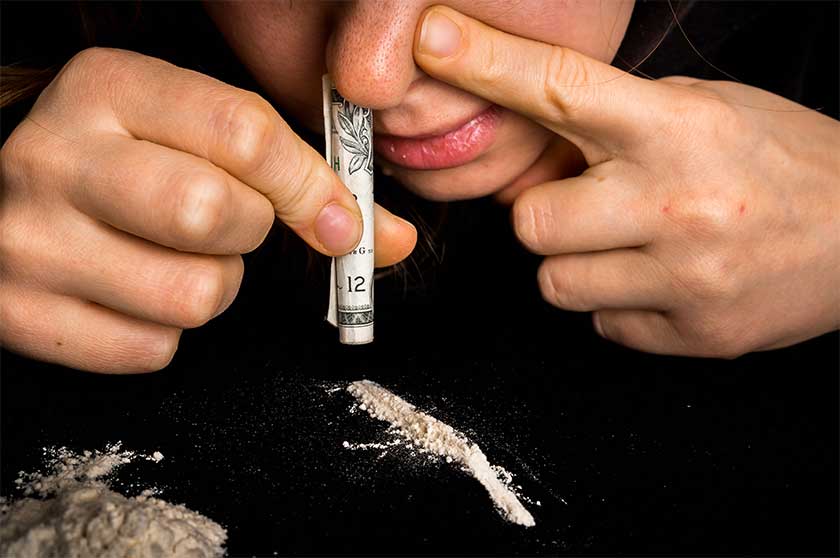Snorting Heroin | Effects & Dangers Of Heroin Insufflation

Medically Reviewed By: Kimberly Langdon, M.D.
While black tar heroin is most commonly injected, white and brown powder heroin can be snorted to deliver a large dose of the drug to the bloodstream very rapidly.

While injecting heroin produces the fastest and most intense rush and high of all methods of use, heroin is often snorted by those who are concerned by the stigma associated with injection drug abuse.
By breathing heroin powder into the nose using a straw, rolled up paper bill, glass or mirrored surface, and certain other paraphernalia, individuals can quickly absorb the drug into blood vessels through the special mucous membranes of the sinuses.
This produces effects that can be felt within 3-5 minutes after drug use.
Effects Of Snorting Heroin
Heroin produces its effects by activating specialized opioid receptors located in the central nervous system, especially the brain.
This has a variety of effects, changing how the nervous system responds to pain and stress at low doses, and triggering a powerful release of dopamine in higher doses.
This dopamine release is pleasurable and compels the brain to make changes and seek out that same pleasurable sensation in the future. The effects on opioid receptors also tend to slow down mental and physical activity as a whole, acting as a potent central nervous system depressant.
Side-Effects Of Heroin Use
Like other opioid drugs, heroin is associated with side effects that may include:
- dry mouth
- flushing
- impaired coordination
- constipation
- nausea
- drowsiness
- slowed heart rate
- itchiness
Dangers Of Snorting Heroin
Regardless of whether this drug is snorted or injected, heroin is a dangerous, unpredictable, and potentially deadly street drug that can cause severe long-term effects, including harm to your physical wellness, mental health, relationships, and lifestyle.
Health risks and other dangers associated with snorting heroin include:
Nasal Injury
Snorting heroin, and the untested additives that dilute it, may cause severe damage to the sinuses and other tissue in your face.
This often causes chronic health issues that may include:
- frequent runny noses
- nosebleeds
- chronic sinus infections
- nasal abscesses
- holes in nasal cartilage (nasal septum perforation)
- congestion
- lung infections
- other infections, including hepatitis
Heroin Overdose
A heroin overdose occurs whenever the effects of the drug are so great that they become harmful or life-threatening. This can result in symptoms including:
- slow, shallow, or interrupted breathing (respiratory depression)
- confusion, drowsiness, or loss of consciousness
- low body temperature, clammy skin, blue-tinted fingers or lips
- pinpoint pupils
Opioid overdoses are a critical medical emergency and a leading cause of injury death in Ohio. But they can be treated with the antidote drug naloxone (Narcan).
A person’s risk of overdose is greatest if they:
- take too much heroin
- take heroin after a period of abstinence, leading to reduced tolerance
- take heroin in combination with other drugs like alcohol, benzodiazepines, or stimulants
- take heroin laced with fentanyl or other hyper-potent synthetic opioids
Heroin Addiction & Dependence
Getting high on heroin activates a specialized reward circuit in the brain that makes lasting changes to your behavior and thinking.
This is why heroin is so addictive and why it so strongly draws those who try heroin once into a repeated and spiraling pattern of heroin abuse and harmful drug addiction.
In turn, this leads to growing heroin dependence and tolerance, as you have to keep taking the drug and increasing your dosage to feel that high and prevent withdrawal symptoms.
Tolerance may also cause a progression from snorting or smoking heroin to using the drug intravenously for heightened effects.
Heroin Addiction Treatment
The substance use disorder treatment programs offered by Ohio Recovery Center can help you stop taking heroin safely and make lasting, positive changes in your life.
A short-term medical detox program can help you work through the uncomfortable but temporary symptoms of heroin withdrawal with close medical support.
Once detox is completed, a personalized heroin addiction treatment program should be developed to meet your specific needs and goals for long-term recovery. This may include treatment options like:
Medication-Assisted Treatment (MAT)
MAT combines the use of one of three FDA-approved medications with counseling and behavioral therapy to produce an effective long-term treatment solution for heroin recovery.
Buprenorphine and methadone can reduce drug cravings and prevent withdrawal symptoms, while naltrexone can block the effects of opioid drugs for extended periods.
Inpatient Rehabilitation
Inpatient/residential addiction treatment programs offer a highly structured, intensive, and focused setting for heroin recovery over a treatment period that usually lasts from 30 to 60 days.
Treatment options may include counseling, behavioral therapy, peer support, dual diagnosis care, and more. To find out if our substance abuse treatment program is right for you or a loved one, please contact us today.
- Centers for Disease Control and Prevention (CDC) — Heroin https://www.cdc.gov/drugoverdose/opioids/heroin.html
- Ohio Department of Health — Drug Overdose https://odh.ohio.gov/know-our-programs/violence-injury-prevention-program/drug-overdose/
- National Institute on Drug Abuse (NIDA) — Heroin DrugFacts https://nida.nih.gov/publications/drugfacts/heroin
- Substance Abuse — Necrosis of the intranasal structures and soft palate as a result of heroin snorting: a case series https://pubmed.ncbi.nlm.nih.gov/24159913/

